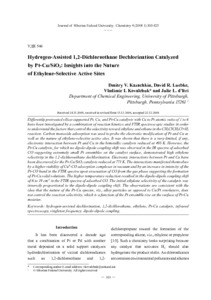Показать сокращенную информацию
Hydrogen-Assisted 1,2-Dichloroethane Dechlorination Catalyzed by Pt-Cu/SiO2: Insights into the Nature of Ethylene-Selective Active Sites
| Автор | Kazachkin, Dmitry V. | |
| Автор | Luebke, David R. | |
| Автор | Kovalchuk, Vladimir I. | |
| Автор | d’Itri, Julie L. | |
| Дата внесения | 2009-03-23T09:21:44Z | |
| Дата, когда ресурс стал доступен | 2009-03-23T09:21:44Z | |
| Дата публикации | 2008-12 | |
| URI (для ссылок/цитирований) | https://elib.sfu-kras.ru/handle/2311/903 | |
| Аннотация | Differently pretreated silica-supported Pt, Cu, and Pt-Cu catalysts with Cu to Pt atomic ratio of 1 to 6 have been investigated by a combination of reaction kinetics and FTIR spectroscopic studies in order to understand the factors that control the selectivity toward ethylene and ethane in the CH2ClCH2Cl+H2 reaction. Carbon monoxide adsorption was used to probe the electronic modification of Pt and Cu as well as the nature of ethylene-selective active sites. It was shown that there is a very limited, if any, electronic interaction between Pt and Cu in the bimetallic catalysts reduced at 493 K. However, the Pt-Cu catalysts, for which no dipole-dipole coupling shift was observed in the IR spectra of adsorbed CO suggesting extremely small Pt ensembles on the catalyst surface, demonstrated high ethylene selectivity in the 1,2-dichloroethane dechlorination. Electronic interactions between Pt and Cu have been discovered for the Pt-Cu/SiO2 catalysts reduced at 773 K. The interactions manifested themselves by a higher stability of Cu0-CO adsorption complexes in vacuum and by an increase in intensity of the Pt-CO band in the FTIR spectra upon evacuation of CO from the gas phase suggesting the formation of Pt-Cu solid solutions. The higher temperature reduction resulted in the dipole-dipole coupling shift of 6 to 19 cm-1 in the FTIR spectra of adsorbed CO. The initial ethylene selectivity of the catalysts was inversely proportional to the dipole-dipole coupling shift. The observations are consistent with the idea that the nature of the Pt-Cu species, viz., alloy particles as opposed to Cu/Pt overlayers, does not control the reaction selectivity, which is a function of the Pt ensemble size on the surface of Pt-Cu moieties. | en |
| Размер | 733091 bytes | |
| MIME | application/pdf | |
| Язык | en | en |
| Издатель | Сибирский федеральный университет. Siberian Federal University | en |
| Является частью серии | Журнал Сибирского федерального университета. Химия. Journal of Siberian Federal University. Chemistry | en |
| Является частью серии | 2008 1 (4) | en |
| Тема | hydrogen-assisted dechlorination | en |
| Тема | 1,2-dichlorothane | en |
| Тема | ethylene | en |
| Тема | Pt-Cu catalysts | en |
| Тема | infrared spectroscopy | en |
| Тема | singleton frequency | en |
| Тема | dipole-dipole coupling | en |
| Название | Hydrogen-Assisted 1,2-Dichloroethane Dechlorination Catalyzed by Pt-Cu/SiO2: Insights into the Nature of Ethylene-Selective Active Sites | en |
| Тип | Journal Article | |
| Тип | Published Journal Article | |
| Контакты автора | Dmitry V. Kazachkin, David R. Luebke, Vladimir I. Kovalchuk and Julie L. d’Itri: Department of Chemical Engineering, University of Pittsburgh, Pittsburgh, Pennsylvania 15261, e-mail: vkovalchuk@mckasd.net | |
| Страницы | 303-325 | |
| sfu.metadata.dc.x-file | http://elib.sfu-kras.ru:8080/bitstream/2311/903/1/01_Kazachkin.pdf |

